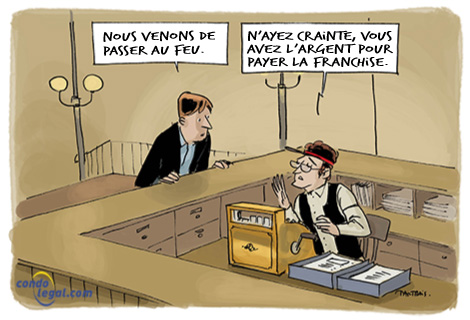Date published: 21/05/2024
Self-Insurance Fund
 Syndicates of co-owners must set up a liquid and available short-term Self-Insurance Fund. The purpose of this fund is to anticipate and finance, in particular, expenses relating to the carrying out of future work following a disaster. This fund, mandatory under article 1071.1 of the Civil Code of Quebec, became necessary because of a substantial increase in (deductible) insurance deductibles. The amount of these deductibles was previously negligible most of the time, whereas today it can reach tens or even hundreds of thousands of dollars. Therefore, it is crucial for co-owners to contribute regularly to this fund to ensure financial stability and preparedness.
Syndicates of co-owners must set up a liquid and available short-term Self-Insurance Fund. The purpose of this fund is to anticipate and finance, in particular, expenses relating to the carrying out of future work following a disaster. This fund, mandatory under article 1071.1 of the Civil Code of Quebec, became necessary because of a substantial increase in (deductible) insurance deductibles. The amount of these deductibles was previously negligible most of the time, whereas today it can reach tens or even hundreds of thousands of dollars. Therefore, it is crucial for co-owners to contribute regularly to this fund to ensure financial stability and preparedness.
Essential monetary reserve
The Self-Insurance Fund will allow the creation of a crucial monetary reserve, in order to pay the sums that the syndicate’s insurance does not cover. For example, if the deductible for a claim is $10,000 and that the damages are assessed to $18,000, the insurer will only pay $8,000.
Furthermore, it should be noted that the government determined by regulation, on April 15, 2020, the terms and conditions that will determine the minimum contribution of the co-owners to this fund.
Purpose
The Self-Insurance fund, which relates to insurance coverage of a co-ownership, is meant to be used for the payment of the various deductible that the syndicate of co-owners must assume following a claim. These deductibles cover the building insurance and the liability insurance of the syndicate, its directors, meeting officers, and the manager. This fund must also be used to repair the damages caused to the property for which the syndicate has an insurable interest (e.g., payment of the cost of the renovation of the building that is not compensated by the insurer), when the contingency fund or an insurance indemnity cannot provide for it (e.g.,.: in the case of an insurance limit, under insurance or exclusions).
This reserve of money is based on the deductible that the syndicate of co-owners must pay in connection with the co-ownership's insurance coverage and a reasonable additional amount to cover other payments to which it is allocated. The financial contribution of the co-owners must equal to the higher deductible (section 2 of the rule) amongst all the insurance coverage subscribed to by a syndicate. Earthquake and flooding deductibles are excluded for the purpose of this calculation, should those coverage be part of the insurance contract.
Capitalization
Responsible for the preservation of the immovable, the board of directors prepares the provisional budget for the condominium. In doing so, it determines the amount of the common charges (condo fees) payable by the co-owners, without forgetting the sums to be deposited in the Contingency Fund and the Self-Insurance Fund.
In this regard, the government has determined by regulation the terms under which the minimum contribution of co-owners to the self-insurance fund is established. Thus, the minimum contribution of co-owners to this fund will have to be established annually, when the Board of Directors adopts the annual budget, referring to one of the following three cases:
- When the capitalization of the Self-Insurance Fund is less than or equal to half of the highest deductible provided for by an insurance contract, the contribution must be equal to half of this deductible. Therefore, if the deductible payable for water damage is $50,000, the amount to be deposit into the Self-Insurance Fund will be $25,000.
- When the capitalization of the Self-Insurance Fund is higher than half of the highest deductible provided for by an insurance contract, the contribution must be equal to the amount resulting from the difference between said deductible and the capitalization of this fund. For example, if the deductible payable for water damage is $50,000, and that the sums accumulated in the Self-Insurance Fund amounts to $30,000, the residual amount to be deposit will be $20,000.
- When the capitalization of the Self-Insurance Fund is higher or equal to the highest deductible provided for by an insurance contract, no contribution is required.
Capping the minimum contribution to the Self-Insurance Fund
The Government of Quebec published in the Official Gazette of Quebec on June 22, 2022, a regulation amending the Regulation establishing various measures concerning the insurance of divided co-ownerships. This regulation modifies the provisions for establishing the minimum contribution to the self-insurance fund of a building held in divided co-ownership so that a contribution bringing the balance of this fund to more than $100,000 can be reduced. Nevertheless, a syndicate of co-owners can always decide to deposit an amount greater than this sum into the self-insurance fund, based on its financial projections.
Separate fund
The sums accumulated therein remain the property of the syndicate. They are not refundable to co-owners who sell their private portion. In addition, as is the case with the Contingency fund, the Self-Insurance Fund cannot be seized by a creditor who has obtained a judgment against the syndicate, unless this judgment is related to the recovery of an amount to which the Self-Insurance Fund is linked.
In addition, the board of directors must use this fund carefully. It cannot, under any pretext, be used to finance maintenance costs relating to the building or the current administration of a condominium. It should only be used to pay for repairs and replacement of common areas following a claim.
 WHAT YOU SHOULD KNOW ! The Self-Insurance Fund must be liquid and available at short term, in order for the syndicate to act diligently in the event of repairs for damages caused to the insured property. This Fund is established according to the deductibles and a reasonable additional amount, in order to provide for other payments to which it is assigned.
WHAT YOU SHOULD KNOW ! The Self-Insurance Fund must be liquid and available at short term, in order for the syndicate to act diligently in the event of repairs for damages caused to the insured property. This Fund is established according to the deductibles and a reasonable additional amount, in order to provide for other payments to which it is assigned.
 WHAT TO KEEP IN MIND : To avoid confusion between the amounts deposited into the administration fund (which is intended for day-to-day operations), the contingency fund and the amounts deposited into the latter, a separate bank account should be opened for each.
WHAT TO KEEP IN MIND : To avoid confusion between the amounts deposited into the administration fund (which is intended for day-to-day operations), the contingency fund and the amounts deposited into the latter, a separate bank account should be opened for each.
 WARNING ! The failure of the board of directors to set up a self-insurance fund could be considered a fault. As a mandatary of the syndicate, the members of the board of directors have an obligation to respect the law and act diligently. They could also be held liable if they constituted a self-insurance fund that was clearly insufficient in relation to their obligations, as is the case with the contingency fund.
WARNING ! The failure of the board of directors to set up a self-insurance fund could be considered a fault. As a mandatary of the syndicate, the members of the board of directors have an obligation to respect the law and act diligently. They could also be held liable if they constituted a self-insurance fund that was clearly insufficient in relation to their obligations, as is the case with the contingency fund.
Back to the factsheets





